Event Marking International Day of Zero Tolerance Against FGM Draws Standing Room Only Crowd in Sulaimani, Iraq
(Sulaimani, Iraq) – More than 100 people crowded into Sulaimani’s Culture Café on Monday, February 6 for an update on the fight against female genital mutilation (FGM) in the Kurdistan Region of Iraq (KRG). The event was held to raise awareness of FGM and to recognize February 6 as “International Day of Zero Tolerance Against Female Genital Mutilation.”
Members of the Iraqi news media joined concerned community members and representatives of local and international non-governmental organizations (NGOs) for the two-hour discussion. A representative of the KRG’s Parliament also was present. The event was sponsored by two international NGOs, Wadi and Hivos.
FGM is globally recognized as a gross violation of human rights of girls and women. FGM continues to be practiced in Iraq and northern Iraqi Kurdistan, despite ongoing efforts to eradicate the practice.
According to Wadi, which has headquarters in Sulaimani, FMG rates are approximately 60 percent in the KRG, with some villages reporting FGM rates of nearly 100 percent. Wadi conducted between 2007 and 2009 the first study of FGM rates in the KRG and based its data on comprehensive field research.
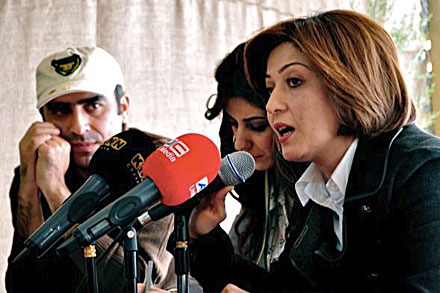
Gasha Dara Hafied, a member of the KRG Parliament, discusses the Law Against Domestic Violence in the Kurdistan Region of Iraq, especially Article Six that criminalizes FGM. Gasha reinforced the need for government and civil society to work together to implement the law and prosecute those who perform FGM in the KRG.
During the event, the “Campaign to Stop FGM in Kurdistan” launched a series of television public service announcements that are expected to air in spring 2012. Hawlati newspaper also was recognized for its early and continued support of the Stop FGM Kurdistan campaign.
Other highlights from the event include:
Moving Toward Enforcement of Law Number 8 in the KRG
Ms. Gasha Dara Hafied, a member of the KRG Parliament and head of its Women’s Rights Committee, spoke about the passage in June 2011 of Law Number 8, The Law Against Domestic Violence in the Kurdistan Region of Iraq. Gasha noted that all but one member of the KRG parliament voted for the law. She stressed that the law’s Article 6, which makes FGM a crime, was one of the most important provisions and a major step toward eradicating the practice in the KRG. Gasha called for close collaboration between the government, civil society, and non-governmental organizations to help enforce the law and bring to justice individuals who continue FGM in the KRG.
Early Data Shows FGM Widespread in Kirkuk, Iraq
A preliminary report of comprehensive field research in Kirkuk, Iraq, found that nearly 40 percent of women and girls surveyed are victims of FGM, according to Awezan Norri of Kirkuk’s Pana Center. The study, which is representative of the diverse religious and cultural population in Kirkuk, will be completed in June 2012. The data reported during the event represents an analysis of roughly 50 percent of data collected. A full report and analysis will be released to the public later this year.
First-Hand Account of the “FGM-Free Village Campaign”
The remote village of Toutakehl in northern Iraq did not initially embrace the FGM-Free Village campaign. According to remarks by Sarhad Ajeeb Wahab, the village’s andjuman (equivalent of major), he first rejected the idea that FGM was a violation of women’s and girl’s rights when a local Wadi team approached him about the campaign.
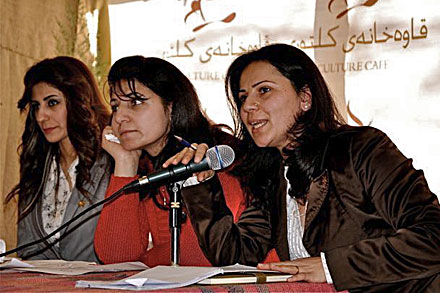
Suaad A. Sharif, Iraq project coordinator of Wadi’s women’s program, discusses Wadi’s efforts to eradicate FGM through working closely with village members in the KRG. She provided information on the “FGM-Free Villages” campaign and announced a new hotline for victims of FGM. Joining Suaad for the discussion is Shang Rahim Karim of the Women’s Legal Assistance program and Gola Ahmad Hama of Wadi’s Raniya team.
After learning more about the issue and hearing facts about the long-term physical and psychological affects of FGM, Sarhad became an advocate for the campaign, and Toutakhel become one of Iraq’s first FGM-Free Villages. On February 6, Sarhad and his spouse, Nasrin Nmig Muhammad, traveled for hours, over mountains and through many small villages to share the story of Toutakhel.
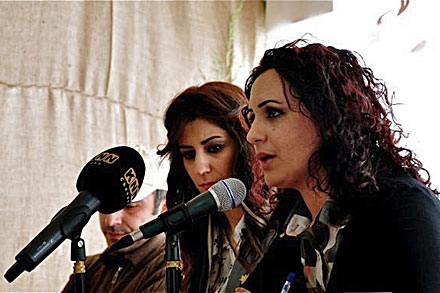
Awezan Nurie of the Pana Center in Kirkuk, provides a preliminary update on FGM rates in the city based on comprehensive field research.
Today, Toutakhel is one of five villages in northern Iraqi Kurdistan that have joined the FGM-Free Village campaign. Suaad A. Sharif, Iraq project coordinator of Wadi’s women’s program, noted during the program that the northern Iraqi villages of Ranija and Oaladiza have signed onto the initiative. One village in Sulaimani Province and two villages in the Garmiyan region also are officially FGM-Free Villages.
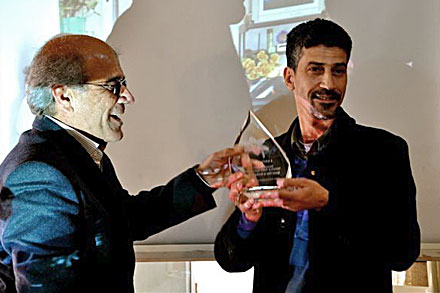
Abdulla Sabier, former director of Wadi, presents an award to Hawlati newspaper for its early and ongoing support of the Stop FGM Kurdistan- campaign.
Help for FGM Victims through a Confidential Hotline
Suaad also announced the KRG’s first confidential hotline for victims of FGM, which provides information and referrals for medical, psychological, and community support. The hotline is also available for general public use to obtain more information on FGM, such as requesting an educational event for the community.
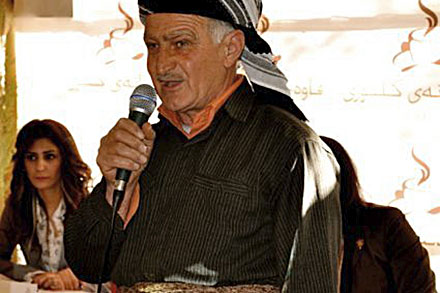
Sarhad Ajeeb Wahab, andjuman (equivalent of major) of Toutakhel (Toutaqal), speaks about his village's commitment to stopping FGM as an FGM-Free Village. Sarhad also raised other important women's rights issues during the discussion.
The February 6 event served as an important public forum to openly discuss FGM in Iraqi Kurdistan, a topic still considered taboo by many in the region. Audience members joined panelists in a final question-and-answer session at the event’s conclusion. The group discussed several pressing human rights issues, including the responsibility of men and women in combating domestic violence.
And while the event highlighted progress made on FGM in particular, such as passage of Law Number 8 and launching of the first confidential hotline for FGM victims, organizers and participants acknowledged that much more work is needed to finally eradicate the practice in Iraqi Kurdistan.
Wadi continues to work closely with local and international NGOs, the United Nations, and the U.S. Department of State to increase awareness of FGM in the Middle East. The organization also continues to pay special attention toward stopping the practice through its FGM-Free Villages campaign and other grassroots outreach and education efforts. Wadi also will continue to press for a coordinated plan of action to implement and enforce Law Number 8 and to prosecute FGM offenders in the KRG.
For more information about the issue, visit www.stopfgmkurdistan.org or www.wadi-online.de.
Heidi F. Diedrich
Media Coverage of the February 6 Event at Culture Café Included:http://www.aknews.com/ku/aknews/3/288453/
http://www.awene.com/Direje.aspx?Babet=Hewal&Jimare=17168
http://www.radionawxo.org/kurdi/index.php?option=com_content&view=article&id=28461:2012-02-06-14-32-04&catid=125:more-news&Itemid=155
http://www.awene.com/Direje.aspx?Babet=Hewal&Jimare=17146
http://www.hawlati.co/babetekan/12632
http://kurdish.sbeiy.com/Detail.aspx?id=3578&LinkID=4











